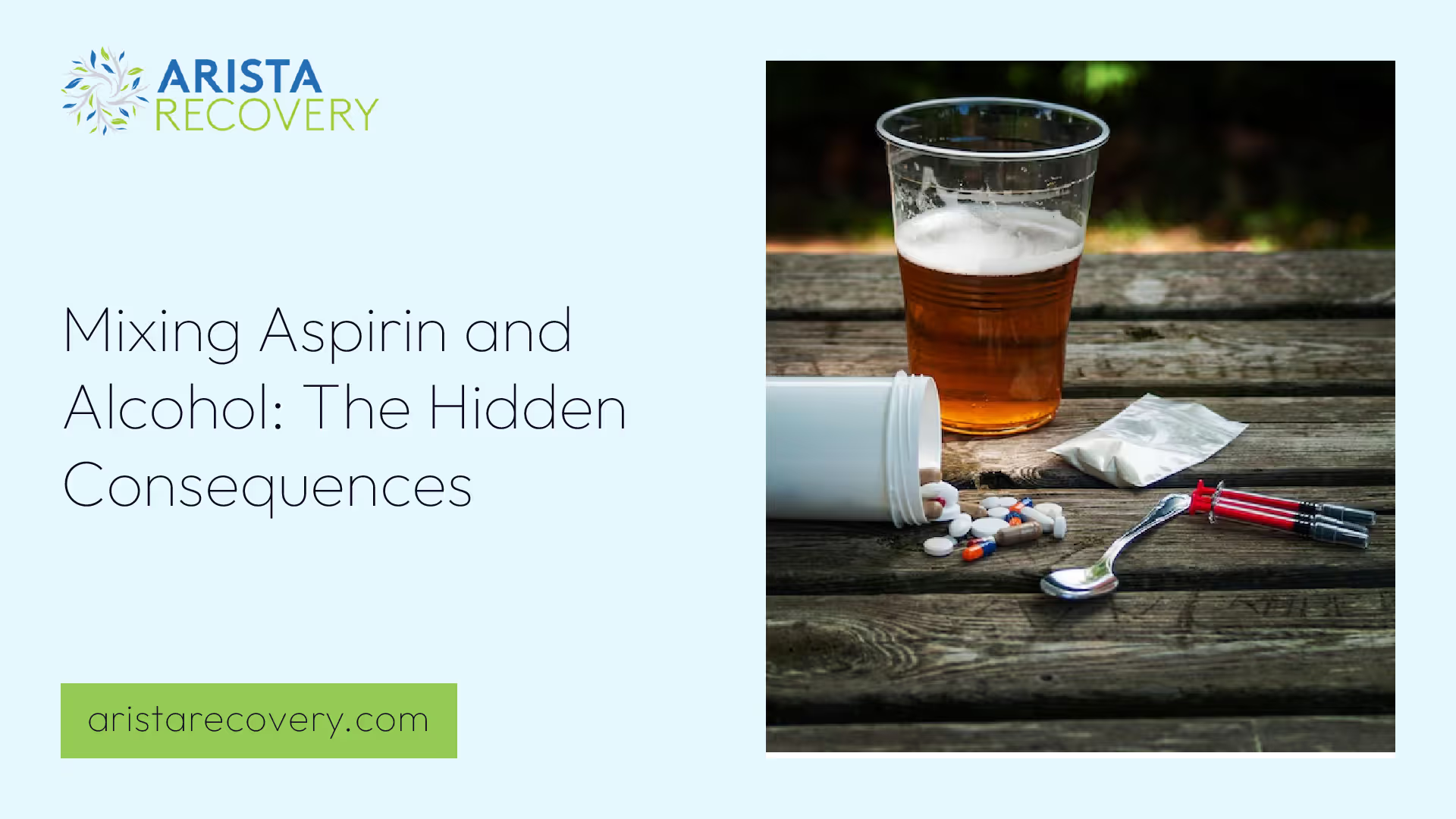
Understanding Aspirin and Alcohol
To comprehend the risks associated with mixing aspirin and alcohol, it's essential first to understand these substances individually.

Basics of Aspirin
Aspirin is a widely used medication belonging to a class of drugs known as nonsteroidal anti-inflammatory drugs (NSAIDs). It is commonly employed to relieve minor aches and pains, reduce fever, and, in low doses, prevent heart attacks and strokes. However, it can also irritate the lining of the stomach and increase the likelihood of ulcers or gastrointestinal bleeding [1].
Given the potential for stomach damage, it is generally recommended that aspirin be taken with food or a full glass of water or milk to minimize possible side effects. Aspirin's potential to cause stomach irritation and bleeding is an important factor to consider when discussing its interaction with alcohol.
Basics of Alcohol
Alcohol, when consumed in moderation, is a common part of social engagements for many. However, it's important to remember that alcohol is a depressant and can have various effects on the body, from causing temporary feelings of relaxation to more serious health issues.
Like aspirin, alcohol can also irritate the stomach lining, making it more susceptible to damage. The cumulative effect of aspirin and alcohol can increase the risk of gastrointestinal bleeding and ulcers.
Moreover, regular consumption of alcohol can lead to liver damage. The liver's job is to metabolize substances we ingest, including alcohol and medications. When aspirin and alcohol are combined, they can impair the liver's ability to function correctly, leading to potential liver damage.
Understanding the nature of both aspirin and alcohol is crucial to grasp the potential risks and adverse effects of mixing these substances. The following sections will delve deeper into the consequences of their interaction, shedding light on the risks and side effects of combining aspirin and alcohol.
Risks of Mixing Aspirin and Alcohol
The interaction between aspirin and alcohol can result in several complications. This section will explore the potential risks, focusing on gastrointestinal complications and the potential for liver damage.
Gastrointestinal Complications
One of the major risks of combining aspirin and alcohol is the increased likelihood of gastrointestinal bleeding and ulcers. Aspirin, a non-steroidal anti-inflammatory drug (NSAID), can irritate the stomach lining and increase the risk of bleeding. This risk is further heightened when alcohol, a gastric irritant, is consumed concurrently [2].
Additionally, this combination can lead to stomach irritation and damage to the stomach lining, potentially resulting in gastritis or stomach ulcers. The discomfort from such conditions can range from mild to severe, depending on the extent of the irritation or damage.
Liver Damage Potential
Another significant risk of mixing aspirin and alcohol is liver damage. Both substances are metabolized in the liver, and their combined intake can strain this organ, impairing its ability to effectively process and eliminate toxins. Over time, this can increase the risk of liver damage.
Moreover, both aspirin and alcohol can have side effects on their own, and mixing the two substances can exacerbate these effects. Aspirin can cause gastrointestinal discomfort such as stomach pain and heartburn, and alcohol can cause dizziness, drowsiness, and impaired coordination. When taken together, these side effects can intensify, potentially leading to increased discomfort or impaired judgment.
In summary, the aspirin and alcohol interaction can have serious health implications, particularly for the gastrointestinal system and the liver. Therefore, it is essential for individuals who regularly consume alcohol or take aspirin to be aware of these risks and to consult with their healthcare provider for guidance and advice.
Side Effects of Aspirin and Alcohol
The aspirin and alcohol interaction can lead to a host of side effects, some of which are severe and require immediate medical attention. Understanding the signs of these side effects is critical to ensuring your safety.
Symptoms of Gastrointestinal Bleeding
The interaction between aspirin and alcohol increases the risk of gastrointestinal bleeding . This increased risk also extends to the development of ulcers Healthline. Furthermore, this combination can lead to stomach irritation and damage to the stomach lining, potentially causing gastritis or stomach ulcers Healthline.
Symptoms of gastrointestinal bleeding can vary, but may include:
- Abdominal pain
- Dark, tarry stools
- Vomiting blood or material that looks like coffee grounds
- Weakness
- Shortness of breath
If you experience any of these symptoms after combining aspirin and alcohol, it is crucial to seek immediate medical attention.
Signs of Liver Dysfunction
The combination of aspirin and alcohol can also increase the risk of liver damage Townsend LA. This is because both substances place a strain on the liver as it works to metabolize them, potentially leading to liver dysfunction over time.
Signs of liver dysfunction can be subtle initially, but may include:
- Yellowing of the skin and eyes (jaundice)
- Dark urine
- Persistent itching
- Abdominal pain and swelling
- Swelling in the legs and ankles
- Chronic fatigue
- Nausea or vomiting
- Loss of appetite
If you notice any of these signs after consuming both aspirin and alcohol, it is advisable to consult a healthcare professional. The earlier liver dysfunction is detected, the better the outcome with appropriate management and treatment.
It's important to understand that aspirin and alcohol can each have side effects on their own, and mixing the two substances can exacerbate these effects. Aspirin can cause gastrointestinal discomfort such as stomach pain and heartburn, and alcohol can cause dizziness, drowsiness, and impaired coordination. When taken together, these side effects can intensify and potentially lead to increased discomfort or impaired judgment Townsend LA.
Impact on Medication Absorption
The interaction of aspirin and alcohol is not limited to their individual effects on the body. They can significantly impact how each other gets absorbed and metabolized in the body, affecting both their effectiveness and the potential risks involved.
Alcohol and Aspirin Metabolism
Alcohol can impair the body's ability to metabolize aspirin effectively, resulting in prolonged exposure to high levels of aspirin in the body [3].
Furthermore, both chronic heavy drinking and acute alcohol consumption can negatively impact the body's ability to metabolize aspirin, leading to increased risks when taken together.
Effect on Medication Efficacy
The efficacy of aspirin can be affected when it is taken in conjunction with alcohol. For instance, mixing alcohol with certain types of aspirin formulations, such as enteric-coated aspirin, can potentially delay the absorption of the medication [2].
This delay in absorption can affect the effectiveness of the medication, resulting in suboptimal outcomes. Therefore, it is advisable to seek medical advice about the timing of alcohol consumption in relation to taking aspirin to ensure optimal absorption and effectiveness of the medication.
The aspirin and alcohol interaction presents potential risks that go beyond their separate effects on the body. It is crucial to be aware of these risks and to take appropriate precautions when using these substances concurrently, such as adjusting the timing of consumption or seeking professional medical advice.
Precautions for Combining Aspirin and Alcohol
It is essential to exercise caution when consuming aspirin and alcohol, as the interaction between these substances can have harmful effects on the body. This section will provide guidance for regular drinkers and advice on the timing of medication.
Considerations for Regular Drinkers
Regular drinkers should be aware that the combination of aspirin and alcohol can lead to harmful consequences. The interaction between these two substances can increase the risk of gastrointestinal bleeding and ulcers Healthline. In addition to this, there is a cumulative effect that can further escalate the risk Healthline.
Regular use of both substances can also lead to liver damage Healthline. The combination can irritate the stomach lining, increasing the risk of gastritis or stomach ulcers Healthline.
As such, individuals who regularly consume alcohol should consult their healthcare provider before taking aspirin. This will allow the understanding of potential risks and benefits based on their individual health conditions Healthline.
Advice for Medication Timing
When contemplating the timing of aspirin consumption in relation to alcohol, it's essential to consider the potential risks associated with their interaction. Aspirin is a nonsteroidal anti-inflammatory drug (NSAID) that can irritate the lining of the stomach and increase the likelihood of ulcers or gastrointestinal bleeding. Alcohol can also irritate the stomach lining, making it more susceptible to damage Townsend LA.
The timing of aspirin intake should be appropriately spaced from alcohol consumption to minimize the risks associated with their interaction. To reduce the risk of stomach irritation and damage to the stomach lining, consider taking aspirin with food or milk. However, it's recommended that individuals consult with a healthcare professional to determine the most suitable timing based on their specific circumstances.
Moreover, the interaction between aspirin and alcohol can impair the body's ability to metabolize both substances, potentially leading to an increased risk of liver damage Townsend LA.
In conclusion, understanding the potential effects of aspirin and alcohol interaction is crucial in mitigating any harmful consequences. It's always prudent to consult a healthcare provider before starting or modifying any medication regimen, especially when alcohol is involved. It's important to remember that while aspirin can be beneficial for certain health conditions, it may also pose risks when combined with alcohol.
Broader Context: Alcohol and Medication Interactions
While the focus of this article is the interaction between aspirin and alcohol, it's important to understand that alcohol can interact with various other medications as well. Two such categories include sedative medications and diabetes medications.
Alcohol and Sedative Medications
Alcohol, being a central nervous system depressant, can enhance the effects of sedative medications. This creates a cumulative effect that can significantly impair a person's ability to operate machinery or drive. The risk of falls, accidents, and other injuries can substantially increase, making it critically important to avoid or limit alcohol consumption when taking sedative medications [4].
Alcohol and Diabetes Medications
For individuals with diabetes, alcohol consumption can interfere with the regulation of blood sugar levels, potentially causing hyperglycemia or hypoglycemia. Diabetes medications, designed to control blood glucose levels, can also lead to hypoglycemia. When combined with alcohol, this risk is further accentuated. Therefore, individuals on diabetes medication need to be particularly cautious about their alcohol intake [4].
It's also important to mention that people with hyperlipidemia may experience exacerbated symptoms when consuming alcohol, as it can inhibit fat metabolism and increase the production of certain lipoprotein particles. Moreover, alcohol consumption can cause a dose-dependent elevation in blood pressure, potentially increasing the risk of cardiovascular disease. Patients with high blood pressure should be questioned about their alcohol intake before starting antihypertensive therapy, as cessation of drinking alone may reduce blood pressure and eliminate the need for medication [4].
This broader perspective underscores the importance of being mindful of alcohol intake when on medication, not just with aspirin. Always consult with a healthcare provider when unsure about potential interactions.
References
[1]: https://www.townsendla.com/blog/aspirin-and-alcohol/
[2]: https://www.healthline.com/health/aspirin-alcohol
[3]: https://www.niaaa.nih.gov/health-professionals-communities/core-resource-on-alcohol/alcohol-medication-interactions-potentially-dangerous-mixes
When mental health challenges and addiction intersect, it can feel isolating. At Arista, we offer compassionate, evidence-based, and trauma-informed care to help you heal, grow, and move forward.
Mixing Aspirin and Alcohol: The Hidden Consequences
You’re not alone in this.
When mental health challenges and addiction intersect, it can feel isolating. At Arista, we offer compassionate, evidence-based, and trauma-informed care to help you heal, grow, and move forward.
Support that moves with you.
You’ve taken a brave first step. At Arista Recovery, we’re here to help you continue with best-in-class care designed for long-term healing and support.
.webp)






